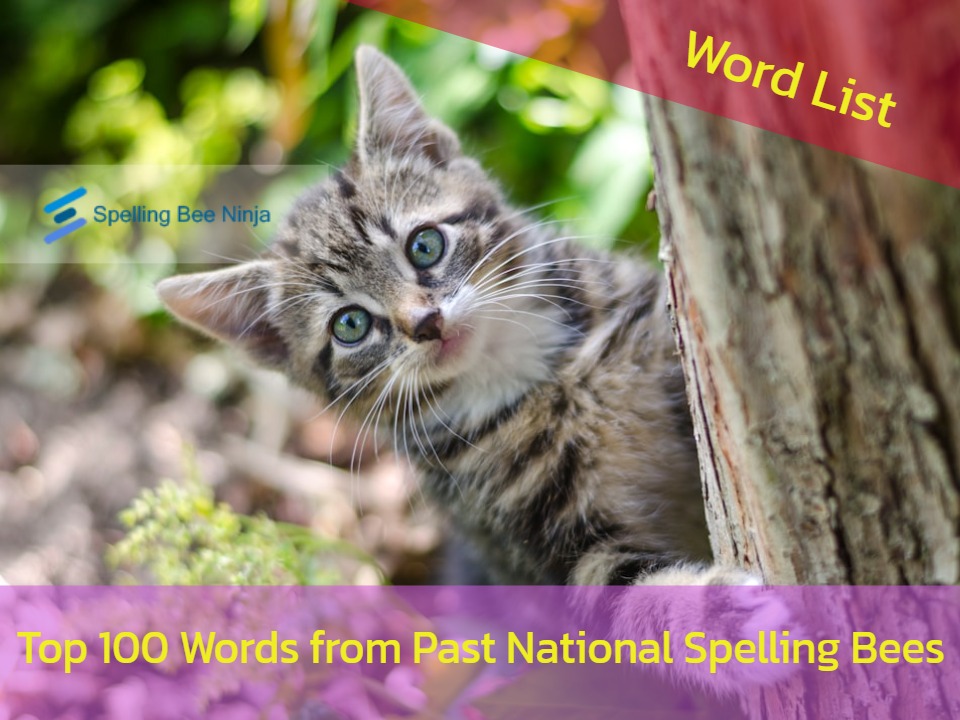Introduction
Every year, the Scripps National Spelling Bee captures the attention of millions as young contestants spell some of the most difficult words in the English language. These words are chosen not just for their obscurity, but for their complexity, origins, and ability to test mastery of spelling rules. Many come from Latin and Greek, while others reflect English’s borrowing from French, German, and beyond. Looking back at words from past competitions gives spellers insight into what to expect and how to prepare. Here are 100 words, grouped by origin and theme, that have challenged—and sometimes crowned—spelling bee champions.
Latin-Derived Words
Latin is the backbone of academic and technical vocabulary in English. Because Latin was the language of law, religion, and scholarship for centuries, its influence runs deep in words related to science, government, and abstract thought. Latin-derived words often feature recognizable prefixes (sub-, inter-, trans-) and suffixes (-tion, -ous, -ity), which make them powerful for building word families. While Latin spellings are usually consistent, the challenge lies in recognizing root meanings and remembering long, multi-syllable structures such as magnanimous or intransigent. Spelling bees favor these words because mastering Latin roots provides clues to thousands of English terms.
Examples:
1. abrogate – to repeal or abolish
2. belligerent – hostile, aggressive
3. carnivorous – meat-eating
4. deleterious – harmful
5. gregarious – sociable
6. intransigent – uncompromising
7. juvenile – young
8. loquacious – talkative
9. mutable – changeable
10. nefarious – wicked
11. obfuscate – to confuse
12. perfidious – treacherous
13. quandary – state of uncertainty
14. resilient – able to recover quickly
15. sanctimonious – hypocritically holy
16. tenacious – persistent
17. ubiquitous – present everywhere
18. venerable – respected
19. volition – will, choice
20. corpulent – fat
21. audacious – bold
22. incredulous – unwilling to believe
23. magnanimous – generous
24. precocious – advanced for one’s age
25. benevolent – kind, charitable
Greek-Derived Words
Greek has supplied English with much of its scientific and philosophical vocabulary. Words of Greek origin often contain letter combinations that don’t follow standard English spelling patterns, such as ph for the “f” sound (philosophy), ch for a “k” sound (chorus), and y used as a vowel (mythology). Compound structures are also common, combining roots like geo- (earth) and graph- (write) to form words such as geography. For spellers, the challenge lies in recognizing these unusual patterns and remembering that Greek loves to stack roots together. Because of this, Greek-derived words often appear long, scientific, and complex—perfect for spelling competitions.
Examples:
26. anachronism – something out of time
27. bibliophile – book lover
28. chrysanthemum – a flower
29. dichotomy – division into two parts
30. euphemism – polite substitution
31. hierarchy – ranking system
32. isothermal – equal temperature
33. kaleidoscope – optical toy
34. metamorphosis – transformation
35. neophyte – beginner
36. onomatopoeia – word imitating sound
37. pseudonym – false name
38. psychosis – severe mental disorder
39. synchronous – occurring at the same time
40. theocracy – rule by religion
41. xenophobia – fear of foreigners
42. zygote – fertilized egg cell
43. philology – study of language
44. hypothesis – assumption for testing
45. apotheosis – highest point
46. catastrophe – disaster
47. orthodox – traditional, strict
48. rhapsody – enthusiastic expression
49. cosmopolitan – worldly, sophisticated
50. ephemeral – lasting a short time
French-Derived Words
Characteristics of French-Derived Words
French has had a profound influence on English vocabulary, especially after the Norman Conquest of 1066, when French became the language of law, government, and high society in England. Words borrowed from French often appear elegant, cultural, or sophisticated, covering fields such as food (soufflé, cuisine), fashion (couture, silhouette), and government (bureaucracy, parliament). For spellers, French-derived words are especially tricky because of their silent letters, unexpected vowel combinations, and accents (é, ç, è). Spellings like façade, cliché, and camouflage challenge contestants since pronunciation doesn’t always match spelling. Mastering French-derived words requires practice with irregular endings, attention to detail, and familiarity with accent marks—features that make them favorites in spelling bees.
French gave English thousands of words in law, food, fashion, and culture. Many French words challenge spellers with silent letters and unusual endings.
Examples:
51. ballet – dance performance
52. bureaucracy – government administration
53. camouflage – disguise
54. chauffeur – driver
55. cliché – overused phrase
56. debris – scattered remains
57. détente – easing of tensions
58. elite – superior group
59. façade – front of a building (figuratively: false front)
60. genre – category of art or literature
61. liaison – connection, go-between
62. matinee – daytime performance
63. negligée – light dressing gown
64. parfait – layered dessert
65. rapport – harmonious relationship
66. souvenir – keepsake
67. silhouette – outline or shadow
68. trompe l’oeil – realistic painting technique
69. valet – personal assistant
70. victoire – victory
German-Derived Words
German has contributed words that often look and sound heavier, with compound structures and strong consonant clusters. Common fields of borrowing include food (sauerkraut, pretzel), science (zeitgeist, leitmotif), and everyday expressions (kindergarten, gesundheit). Unlike French, German spelling is more phonetic, but its compounds can be daunting because they stack multiple roots together into long words, such as Doppelgänger or Schadenfreude. The use of umlauts (ä, ö, ü) and unique letter pairings like sch and tz also trip up spellers unfamiliar with German rules. These words stand out in spelling bees because they combine memorable sounds with uncommon structures in English.
Examples:
71. angst – deep anxiety
72. blitzkrieg – lightning war
73. doppelgänger – ghostly double
74. ersatz – substitute, inferior copy
75. gesundheit – “bless you” after a sneeze
76. hinterland – remote region
77. kaput – broken
78. kindergarten – preschool
79. lager – type of beer
80. leitmotif – recurring theme
81. poltergeist – noisy ghost
82. rucksack – backpack
83. schadenfreude – pleasure from others’ misfortune
84. übermensch – “superman” concept from Nietzsche
85. wunderkind – child prodigy
Miscellaneous Borrowings
English has borrowed words from languages worldwide, many of which stump spelling bee contestants.
Examples:
86. algebra – Arabic origin (mathematics)
87. safari – Swahili (journey)
88. tsunami – Japanese (harbor wave)
89. karaoke – Japanese (empty orchestra)
90. chutney – Hindi (spicy condiment)
91. samosa – Hindi/Urdu (fried pastry)
92. pajamas – Hindi/Persian (loose clothing)
93. tundra – Russian (treeless plain)
94. sputnik – Russian (satellite)
95. czar/tsar – Russian (emperor)
96. kangaroo – Aboriginal Australian
97. boomerang – Aboriginal Australian
98. yoga – Sanskrit (union, discipline)
99. typhoon – Chinese/Arabic hybrid
100. origami – Japanese (paper folding)
Comparison of Latin, Greek, French, and German Words in Spelling Bees
| Language Origin | Typical Fields | Spelling Features | Common Challenges for Spellers | Example Words |
|---|---|---|---|---|
| Latin | Law, government, science, religion | Prefixes (sub-, inter-) and suffixes (-tion, -ous); long multi-syllables | Remembering root meanings; handling long words | benevolent, resilient, precocious |
| Greek | Science, philosophy, medicine, abstract ideas | ph = f, ch = k, y as vowel; compound roots | Unusual letter patterns; very long technical terms | chrysanthemum, onomatopoeia, hypothesis |
| French | Food, fashion, art, law, culture | Silent letters; accents (é, ç, è); irregular endings | Pronunciation differs from spelling; accents are tricky | camouflage, façade, liaison |
| German | Food, philosophy, everyday words, science | Heavy consonant clusters (sch, tz); compound words | Long word structures; umlauts (ä, ö, ü) | schadenfreude, doppelgänger, kindergarten |
Tips for Studying Past Spelling Bee Words
Learn by Origin – Study word lists grouped by Latin, Greek, French, etc. Patterns emerge quickly.
Understand Roots – Knowing roots like scrib/script (write) or philo (love) makes spelling predictable.
Practice Silent Letters – Especially in French and English borrowings.
Study Word Families – Words built from the same root often appear in different competitions.
Listen to Pronunciation Carefully – Bee judges give root origin and definition; use them to your advantage.
PDF, Flashcards and SBN formats
 | > 100 Words from Past National Spelling Bees in PDF Format |
 | > 100 Words from Past National Spelling Bees FLASHCARDS in PDF Format |
 | > 100 Words from Past National Spelling Bees with our SBN APP |
Conclusion
The 100 words above showcase the incredible diversity of the English language, as well as the challenges of mastering spelling bees. From Latin and Greek classics to French elegance, German compounds, and global borrowings, every word carries history, culture, and complexity. By studying past words and understanding their origins, spellers not only prepare for competition but also gain a lifelong appreciation for the richness of English


